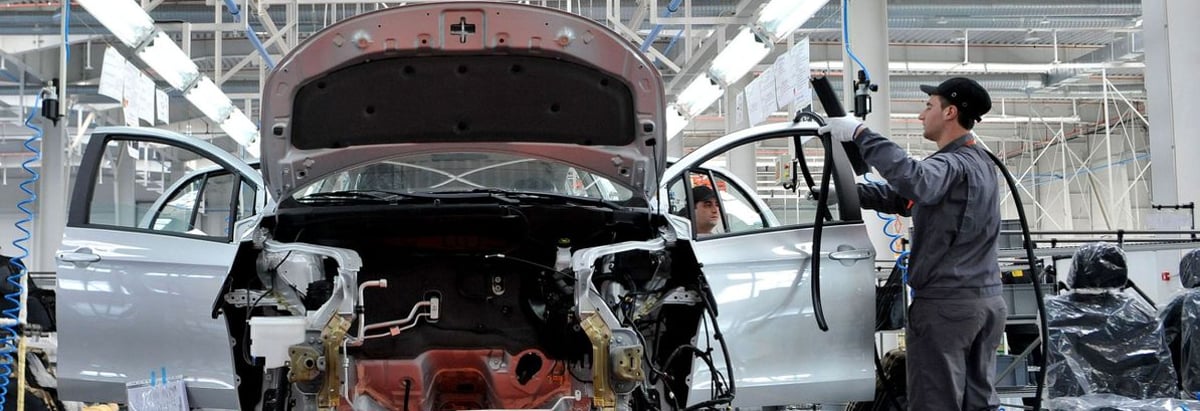Stock Analysis

Some say volatility, rather than debt, is the best way to think about risk as an investor, but Warren Buffett famously said that 'Volatility is far from synonymous with risk.' It's only natural to consider a company's balance sheet when you examine how risky it is, since debt is often involved when a business collapses. We note that Yulon Motor Company Ltd. (TWSE:2201) does have debt on its balance sheet. But should shareholders be worried about its use of debt?
When Is Debt A Problem?
Debt assists a business until the business has trouble paying it off, either with new capital or with free cash flow. In the worst case scenario, a company can go bankrupt if it cannot pay its creditors. While that is not too common, we often do see indebted companies permanently diluting shareholders because lenders force them to raise capital at a distressed price. Of course, the upside of debt is that it often represents cheap capital, especially when it replaces dilution in a company with the ability to reinvest at high rates of return. When we examine debt levels, we first consider both cash and debt levels, together.
View our latest analysis for Yulon Motor
How Much Debt Does Yulon Motor Carry?
The image below, which you can click on for greater detail, shows that Yulon Motor had debt of NT$253.8b at the end of June 2024, a reduction from NT$266.5b over a year. However, it does have NT$18.0b in cash offsetting this, leading to net debt of about NT$235.8b.
A Look At Yulon Motor's Liabilities
Zooming in on the latest balance sheet data, we can see that Yulon Motor had liabilities of NT$274.7b due within 12 months and liabilities of NT$26.0b due beyond that. Offsetting these obligations, it had cash of NT$18.0b as well as receivables valued at NT$236.9b due within 12 months. So its liabilities total NT$45.8b more than the combination of its cash and short-term receivables.
This deficit is considerable relative to its market capitalization of NT$61.3b, so it does suggest shareholders should keep an eye on Yulon Motor's use of debt. This suggests shareholders would be heavily diluted if the company needed to shore up its balance sheet in a hurry.
We use two main ratios to inform us about debt levels relative to earnings. The first is net debt divided by earnings before interest, tax, depreciation, and amortization (EBITDA), while the second is how many times its earnings before interest and tax (EBIT) covers its interest expense (or its interest cover, for short). This way, we consider both the absolute quantum of the debt, as well as the interest rates paid on it.
Weak interest cover of 1.6 times and a disturbingly high net debt to EBITDA ratio of 16.9 hit our confidence in Yulon Motor like a one-two punch to the gut. The debt burden here is substantial. Investors should also be troubled by the fact that Yulon Motor saw its EBIT drop by 14% over the last twelve months. If that's the way things keep going handling the debt load will be like delivering hot coffees on a pogo stick. There's no doubt that we learn most about debt from the balance sheet. But it is future earnings, more than anything, that will determine Yulon Motor's ability to maintain a healthy balance sheet going forward. So if you're focused on the future you can check out this free report showing analyst profit forecasts.
Finally, a company can only pay off debt with cold hard cash, not accounting profits. So we always check how much of that EBIT is translated into free cash flow. During the last three years, Yulon Motor burned a lot of cash. While that may be a result of expenditure for growth, it does make the debt far more risky.
Our View
To be frank both Yulon Motor's net debt to EBITDA and its track record of converting EBIT to free cash flow make us rather uncomfortable with its debt levels. And even its EBIT growth rate fails to inspire much confidence. After considering the datapoints discussed, we think Yulon Motor has too much debt. While some investors love that sort of risky play, it's certainly not our cup of tea. The balance sheet is clearly the area to focus on when you are analysing debt. But ultimately, every company can contain risks that exist outside of the balance sheet. To that end, you should learn about the 2 warning signs we've spotted with Yulon Motor (including 1 which is a bit unpleasant) .
Of course, if you're the type of investor who prefers buying stocks without the burden of debt, then don't hesitate to discover our exclusive list of net cash growth stocks, today.
New: Manage All Your Stock Portfolios in One Place
We've created the ultimate portfolio companion for stock investors, and it's free.
• Connect an unlimited number of Portfolios and see your total in one currency
• Be alerted to new Warning Signs or Risks via email or mobile
• Track the Fair Value of your stocks
Have feedback on this article? Concerned about the content? Get in touch with us directly. Alternatively, email editorial-team (at) simplywallst.com.
This article by Simply Wall St is general in nature. We provide commentary based on historical data and analyst forecasts only using an unbiased methodology and our articles are not intended to be financial advice. It does not constitute a recommendation to buy or sell any stock, and does not take account of your objectives, or your financial situation. We aim to bring you long-term focused analysis driven by fundamental data. Note that our analysis may not factor in the latest price-sensitive company announcements or qualitative material. Simply Wall St has no position in any stocks mentioned.
About TWSE:2201
Yulon Motor
Manufactures and markets automobiles and related parts in Taiwan, China, and the Philippines.


